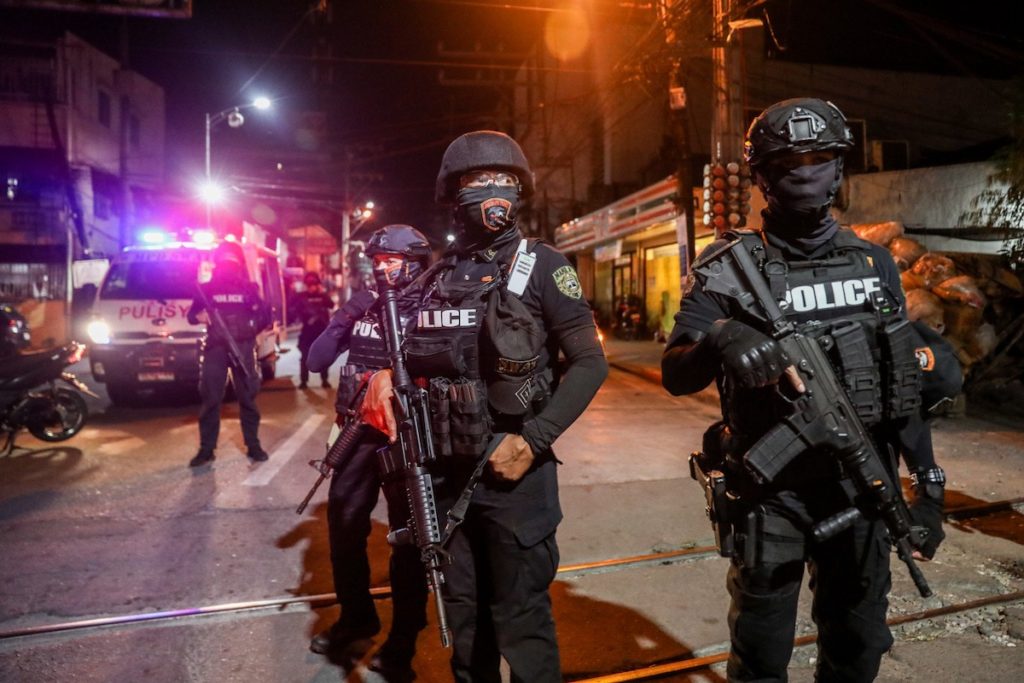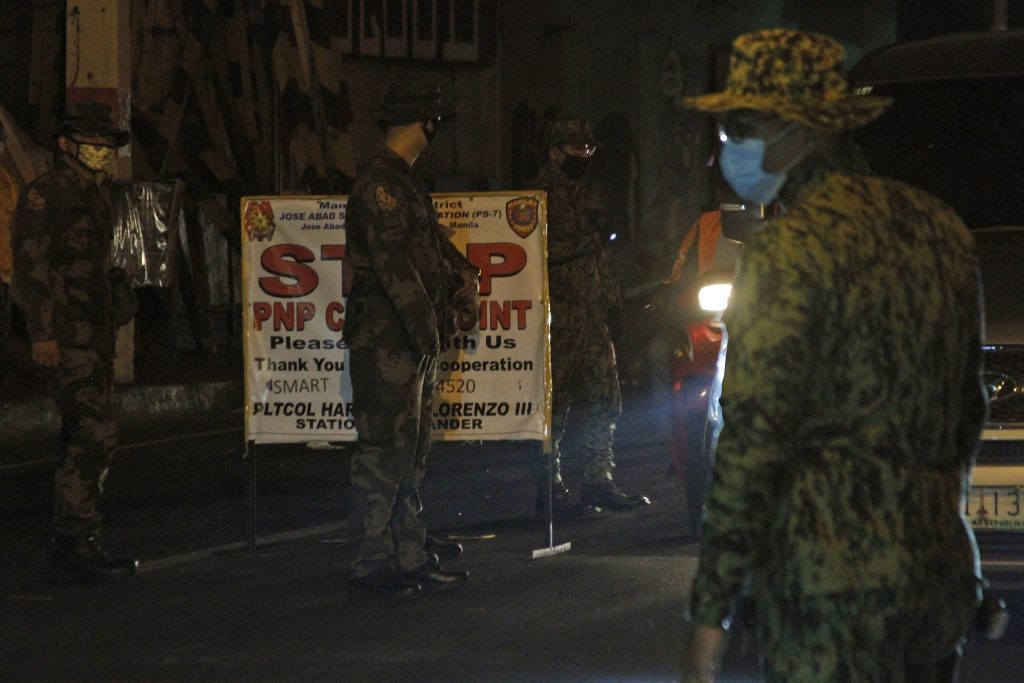
Half-past nine in the morning, year 2018, on a dirt road no wider than a goat trail, with both sides thick with undergrowth and brushwood.
On this road leading to San Roque village, Sta. Rita, Samar, six junior police officers of the 805th Company of the Philippine National Police (PNP) Regional Mobile Force Battalion fell in a “misencounter” with 17 soldiers of the 87th Infantry Battalion based in Calbiga, Samar.
According to the news, both teams were in the middle of conducting patrols in Sitio Lunoy, a sub-village of San Roque village past nine in the morning.
Months before the lockdown, sometime June 2020, four military men, allegedly part of the Armed Forces’ intelligence unit allegedly in pursuit of terrorist elements, died in a “misencounter” with Sulu police.
The PNP stated initially that the fatal shooting occurred after a chase, when the soldiers decided to “leave the police station” and eventually grabbed their firearms while facing the police.
The AFP, however, denied the allegations, “calling the initial police report as ‘fabricated’ and ‘misleading.’” Photos and videos of the incident, which had gone viral on social media, showed the soldiers were unarmed.
On the night of Feb. 25, 2021, sometime half-past six in the evening, in a fast-food complex along Commonwealth in Quezon City, intelligence agents of the Philippine Drug Enforcement Agency (PDEA) engaged Quezon City police officers in a firefight which forced responding authorities to shutdown traffic in the said area.
As the smoke cleared, reports say two police officers died during the “misencounter.” PDEA operatives suffered injuries. PDEA spokesperson Director Derrick Carreon told reporters that anti-drug operatives were conducting legitimate operations in the area when the shootout transpired.
As of this writing, the question of who started the firefight remains sketchy.
Any cursory reading of the news will tell you that in all three “misencounters,” both armed agencies had said the same thing: not to blow the incident out of proportion.
My question is: with all the secrecy going into the drafting of their accounts, by what “proportion” should we consider these “misencounters” in the first place?
My second question is: how many more of these “misencounters” remain unreported?
And these aren’t the only two questions that need asking. Do these incidents happen because of failure in coordination or intelligence gathering procedures? Miscommunication, perhaps? Are our security forces losing site of their tasks that they’d rather go after each other’s necks?
Is the funding altogether insufficient?
The PNP, in 2020, bagged P806 million in funds, the Department of National Defense-AFP roughly P1.7 billion. Confidential and intelligence funds of the Office of the President had skyrocketed to P4.5 billion in 2020, more than half of the P8.28 billion allotted for all agencies with confidential funds.
How is this insufficient?

The budget alone has virtually turned our country into an alleged police state, according to Bayan Muna Rep. Carlos Zarate. If such an amount goes to surveillance and intelligence operations, then why are our officers from the PNP and AFP end up killing each other?
Have we gone so low, so laughable, that our very own officers and operatives, despite the training and budget, cannot tell the criminal-terrorist from the police-military personnel?
In one report, soldiers who figured in the armed engagement with members of the PNP in Samar in 2018 “claimed they mistook the cops for communist rebels.”
If such is the case, then this administration is in deeper trouble than previously claimed.
This brings me to my next question: is this failure to tell a criminal from an officer of the law the reason why the PNP has had numerous cases of mistaken identity?
Remember the arrest of veteran Mindanao journalist Margarita Valle in 2019? A case of mistaken identity. And what of the shooting of a van by police operatives in 2017, killing an innocent woman who was on her way to a hospital, including her companion? Ten police officers opened fire on the van.
In 2019, Baltasar Cresosto Saldo, 54, was mistakenly identified as Virgilio Paragan, an ex-commander of the New People’s Army wanted for a string of criminal charges. Before his eventual release, Saldo was earlier paraded by Police Brigadier Gen. John Bulalacao, Police Regional Office (PRO)-6 director, as a criminal in front of the media.
Isn’t it also true that in the same year, the Department of Justice had ordered the PNP to suspend the rearrest of heinous crime convicts released under the good conduct time allowance (GCTA) law to avoid “mistaken identity”?
In short, is this getting to be a really tiresome habit among our uniformed officers?
Apparently, these “misencounters” and cases of “mistaken identity” have been going on for years. One particular incident in 2014 caught my attention: two elderly persons in Mexico, Pampanga—a midwife and a retired driver, both in their mid-60s—arrested by counterinsurgency teams from the AFP-PNP. Both were mistakenly tagged as “top leaders” of the Communist Party of the Philippines-New People’s Army.
The curious thing about the arrests (which included a list of 70 suspected communists) is the reward of the capture, which went to the tune of P10.6 million.
So, was there even a smidgen of correlation between arrest and reward money? Just asking.
In the first quarter of 2006, the arrest of a certain Allan Almoite in Quezon City by 38 members of the Quezon City District Command’s Anti Terrorism Operations Team, led to the suspect’s detention and eventual torture.
Information on the said suspect indicated that he was “a bomb expert of the Rajah Sulaiman Islamic Movement which has close ties with the Abu Sayyaf Group and that he is linked to a series of bombings in Zamboanga City as well as the 2005 Valentine’s Day bombing in Makati City.”
According to the Supreme Court Third Division decision (G.R. No. 215008):
“On March 17, 2006, the Commission on Human Rights (CHR) conducted a physical and psychological examination of Almoite based on the latter’s complaint that he was tortured during his detention. Subsequently, the Forensic and Medical Division of the CHR issued a report indicating that physical injuries were found on different parts of Almoite’s body and that these injuries are consistent with torture and ill-treatment.
“On June 21, 2006, the RTC which issued the arrest warrant came out with an Order which, among others, directed the release of Almoite on the ground that he was not identified as the same person mentioned in the Information as ‘Ali’ and that neither was the name ‘Allan Almoite y Morales’ mentioned in the same information for kidnapping and serious illegal detention with ransom.”
While the court found Almoite’s charges of torture against the officers desperately wanting (he wasn’t able to identify them accurately and with unassailable evidence), I was stunned at the reason why the SC dismissed the petition of the Office of the Ombudsman:
“As aptly cited by the CA [Court of Appeals], this Court, speaking through Justice Malcolm, in the case of U.S. v. Santos, ruled that: One should however not expect too much of an ordinary policeman. He is not presumed to exercise the subtle reasoning of a judicial officer. Often, he has no opportunity to make proper investigation but must act in haste on his own belief to prevent the escape of the criminal. To err is human. Even the most conscientious officer must at times be misled. (Source: Chan C. Robles Virtual Law Library).”
One should however not expect too much of an ordinary policeman. Granted that an ordinary policeman falls short in the intelligence of a judicial officer, aren’t they enjoined by training and intelligence information as to how they must conduct themselves?
Because if the axiom “To err is human” would be the final verdict each time an officer of the law transgresses his badge and the dignity of the citizen, presumably done “in good faith,” aren’t the courts encouraging our officers not to aspire for the better?
All that budget and training and all we get are poor excuses for peace officers. They give mediocre a bad name.
Joel Pablo Salud is an editor, journalist and the author of several books of fiction and political nonfiction. The views and opinions expressed in this article are those of the author and do not necessarily reflect the official editorial position of LiCAS.news.
Source: Licas Philippines
0 Comments